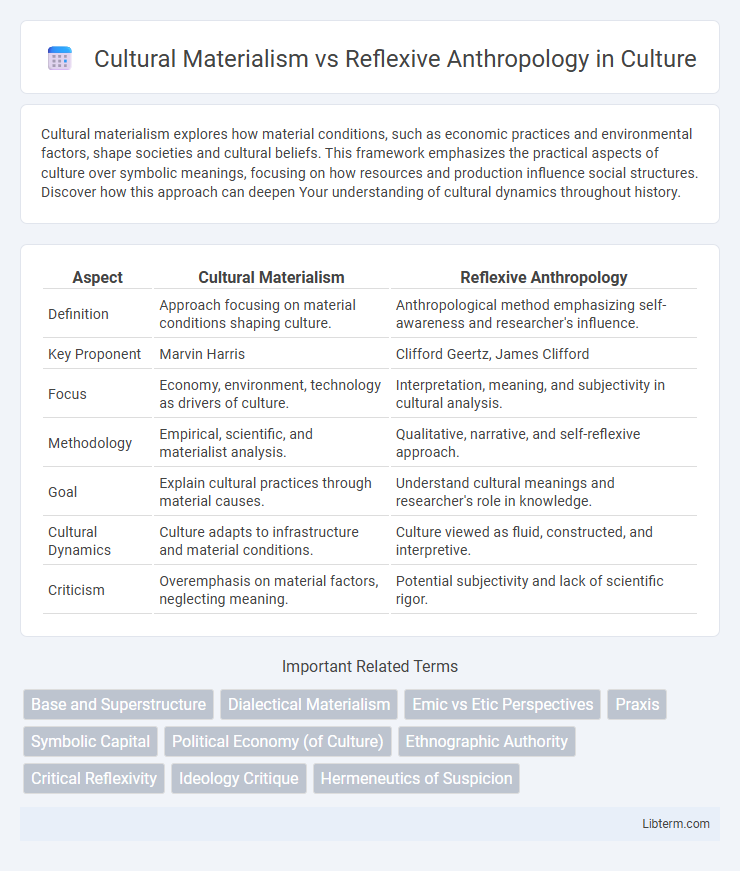Cultural materialism explores how material conditions, such as economic practices and environmental factors, shape societies and cultural beliefs. This framework emphasizes the practical aspects of culture over symbolic meanings, focusing on how resources and production influence social structures. Discover how this approach can deepen Your understanding of cultural dynamics throughout history.
Table of Comparison
| Aspect | Cultural Materialism | Reflexive Anthropology |
|---|---|---|
| Definition | Approach focusing on material conditions shaping culture. | Anthropological method emphasizing self-awareness and researcher's influence. |
| Key Proponent | Marvin Harris | Clifford Geertz, James Clifford |
| Focus | Economy, environment, technology as drivers of culture. | Interpretation, meaning, and subjectivity in cultural analysis. |
| Methodology | Empirical, scientific, and materialist analysis. | Qualitative, narrative, and self-reflexive approach. |
| Goal | Explain cultural practices through material causes. | Understand cultural meanings and researcher's role in knowledge. |
| Cultural Dynamics | Culture adapts to infrastructure and material conditions. | Culture viewed as fluid, constructed, and interpretive. |
| Criticism | Overemphasis on material factors, neglecting meaning. | Potential subjectivity and lack of scientific rigor. |
Introduction to Cultural Materialism and Reflexive Anthropology
Cultural Materialism is an anthropological framework emphasizing the material aspects of culture, such as environment, technology, and economic factors, as primary determinants of social structure and ideology. Reflexive Anthropology critiques traditional objectivity by acknowledging the anthropologist's influence on their research and promoting self-awareness and critical reflection during ethnographic study. Both approaches offer distinct but complementary insights into understanding cultural dynamics, with Cultural Materialism focusing on external conditions and Reflexive Anthropology emphasizing the researcher's interpretive role.
Historical Background and Theoretical Foundations
Cultural Materialism, rooted in Marvin Harris's work during the 1960s, emphasizes material conditions such as technology, environment, and economic factors as primary drivers of cultural development. Reflexive Anthropology, pioneered by scholars like Clifford Geertz and developed in the 1980s, focuses on self-awareness and the interpretative role of the anthropologist, highlighting how cultural meanings are constructed and understood through ethnographic writing. These theoretical foundations reflect a shift from objective analysis of material conditions to subjective interpretation of cultural symbols and narratives.
Key Proponents and Influential Works
Cultural Materialism, primarily advanced by Marvin Harris in his influential work "Cultural Materialism: The Struggle for a Science of Culture" (1979), emphasizes material conditions underlying societal structures and cultural practices. Reflexive Anthropology, championed by scholars like Clifford Geertz through seminal texts such as "The Interpretation of Cultures" (1973), prioritizes the subjective interpretation and symbolic meanings within cultures. Harris' focus on infrastructure and ecological factors contrasts with Geertz's interpretive approach centered on thick description and the complexities of human experience.
Core Principles of Cultural Materialism
Cultural Materialism centers on the idea that material conditions, such as economic factors, technology, and environment, primarily shape culture and social structure. It emphasizes empirical observation and scientific methodology to analyze the infrastructure, structure, and superstructure of societies. This approach contrasts with Reflexive Anthropology, which focuses on the subjective experiences and reciprocal relationships between anthropologists and their subjects.
Core Tenets of Reflexive Anthropology
Reflexive Anthropology emphasizes the importance of self-awareness and critical self-examination by anthropologists regarding their own biases, positionality, and influence on research outcomes. It challenges the objective stance of Cultural Materialism, advocating for transparency in how anthropologists' identities shape ethnographic interpretation and knowledge production. Reflexive Anthropology promotes collaborative methodologies that foreground indigenous voices and prioritize the co-construction of cultural understanding.
Methodological Approaches: Comparison and Contrast
Cultural Materialism employs a scientific, empirical methodology emphasizing the analysis of material conditions such as technology, environment, and economic factors to explain cultural practices. Reflexive Anthropology adopts a qualitative, interpretive approach prioritizing the researcher's self-awareness and the subjective experiences of studied communities to understand cultural meanings. While Cultural Materialism seeks objective causality through measurable data, Reflexive Anthropology values contextualized narratives and the co-construction of knowledge between anthropologist and subject.
Strengths and Limitations of Cultural Materialism
Cultural Materialism excels in analyzing how material conditions, such as environment, technology, and economy, shape societal structures and cultural practices, providing concrete, empirical data for understanding cultural development. It offers a systematic approach to uncovering the infrastructural base of societies but often faces criticism for its deterministic outlook and limited attention to individual agency and symbolic meanings. Despite its limitations, Cultural Materialism remains valuable for explaining cultural patterns through measurable factors while requiring supplementation to fully grasp subjective and interpretive cultural elements.
Reflexivity in Ethnographic Practice
Reflexive anthropology emphasizes the importance of self-awareness and critical examination of the anthropologist's influence on ethnographic research, prioritizing transparency in the construction of knowledge. Unlike cultural materialism, which focuses on material conditions and empirical data to explain cultural phenomena, reflexive ethnography foregrounds the researcher's positionality, subjectivity, and the dialogic relationship with participants. By incorporating reflexivity, ethnographers aim to produce more nuanced, ethically responsible accounts that recognize the complexities of interpreting cultures.
Case Studies: Applications in Anthropological Research
Cultural Materialism emphasizes analyzing material conditions like environment, technology, and economy in case studies such as Marvin Harris's work on the sacred cow in India, revealing how ecological and economic factors shape cultural practices. Reflexive Anthropology, exemplified by Clifford Geertz's studies in Bali, focuses on interpreting symbolic meanings and the researcher's role, highlighting how embedded cultural narratives influence human behavior and social structures. Both approaches offer distinct frameworks for anthropological research, with cultural materialism prioritizing empirical data and reflexive anthropology emphasizing interpretive understanding.
Contemporary Relevance and Future Directions
Cultural Materialism prioritizes empirical data and material conditions as key drivers of social life, offering practical insights for addressing contemporary social inequalities and environmental challenges. Reflexive Anthropology emphasizes self-awareness and the researcher's positionality, enhancing ethical standards and promoting inclusive narratives in modern ethnographic studies. Future directions involve integrating materialist analysis with reflexive methodologies to develop holistic frameworks that address complex global issues like globalization, digital transformation, and cultural hybridity.
Cultural Materialism Infographic

 libterm.com
libterm.com